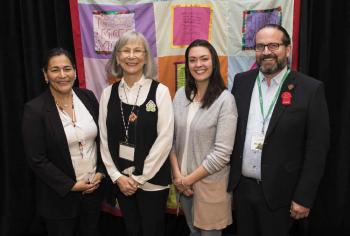Image Caption
Summary
By Stephanie Joe
Windspeaker.com Contributor
CALGARY
Part II of the Truth Gathering process of the National Inquiry into Missing and Murdered Indigenous Women and Girls (MMIWG) has continued today in Calgary.
The opening ceremonies took place today May 28 at the Sheraton Suites Calgary Eau Claire. Ten witnesses of the institutional hearings on government services are scheduled to speak in front of the commissioners of MMIWG throughout the week.
The issues covered this week are government-, victim-, health-, and housing services-related. The hearings are expected to go until Friday, June 1
In preparation for the opening ceremonies, three Elders from Treaty 7 territory were asked to say a prayer in their traditional languages. The lighting of a Qulliq was done by Elder Louise Haulli.
Cynthia Cardinal, a spokesperson for members of the National Family Advisory Circle, said their role is to advise the commissioners and staff of the National Inquiry. Cardinal’s sister’s remains were found on the infamous farm of Robert Pickton in British Columbia.
“There were many flaws with investigators through the Pickton trial that were very negligent in their duties,” said Cardinal. “Also, with victim services,” she added, “we’d gone through quite a real bad experience. I’m hoping throughout these hearings we can make some changes so that it works for our women.”
Cardinal went on to say that she used to be angry, but she turned that anger into something good.
“With my little sister, we started an organization called Edmonton Sisters 4 Sisters Society,” she said. The organization supports family members of MMIWG who attend court for their loved ones.
“Our goal is to one day have a healing lodge for the families who need support,” said Cardinal. “I pray we can help change the attitudes and unfairness towards our Native women and children.”
Chief Commissioner Marion Buller said the National Inquiry is truly an historic undertaking, and so far they’ve heard from more than 1,200 people.
“People who have lived through profound tragedy and loss,” she said. Those people consist of family members and survivors who have spoken their truths at community hearings and statement gatherings across the country.
“We will continue to hear from those voices,” Buller said. “Today is a great day. We start in this phase to take a close look at some of the existing institutional policies and practices that contribute to our loss of traditional knowledge, culture and a profound intergenerational trauma and violence that too many of us have experienced and continue to experience.”
Buller hopes that the hearings will provide knowledge as to what has worked and what is working to reduce violence against women and girls when it comes to government services.
“This is very important work,” she said. “It will help us better understand the systemic causes of all forms of violence against our women and girls and analyze the underlying systemic causes that contribute to the ongoing violence.
“Also, this is going to provide us the foundation that needs to be done for good recommendations that hopefully will end this national tragedy.”
Commissioner Qajaq Robinson said after sifting through the evidence and statements of the 1,200-plus people, they’ve come to see recurring themes. Violence against women and girls is perpetuated by lack of services, shelter and nowhere to go, especially in isolated communities.
“I’m looking forward to hearing from the witnesses who are going to be speaking this week,” she said. “I’m eager to hear what you have to bring and teach us.”
She also encouraged those speaking to shed their guilt and defensiveness and recognize that the status quo, as it is, is unacceptable.
“We must challenge it and you play a role in that,” said Robinson. “Because the objective at the end of the day is to have safer communities.”
Commissioner Brian Eyolfson said the commissioners have been busy receiving the testimonies of families and survivors.
“Hearing these personal truths of loss and pain has been incredibly humbling and has been a profound experience,” he said. He went on to say that the National Inquiry has endorsed recommendations that include federally coordinated cross jurisdictional national action plans to address violence against Indigenous women and girls and LGBTQ people.
These plans include government services such as improved access to safe housing, culturally appropriate health, mental health, addictions, and child services, as well as programming for Indigenous men, to help break and prevent cycles of violence.
“In this week we’ll hear from witnesses about some of these subjects and we’ll gain a better understanding of how access to services or lack of access relates to the vulnerability to Indigenous women and girls and we’ll learn about what can be done to support our people in the communities,” said Eyolfson.
Commissioner Michele Audette stated that the energy in governmental hearings is not the same energy as community hearings.
“But let’s not forget that every word that you will say in this space will bring a lot of emotion from the family perspectives,” she said. She suggested that public debate is needed to provide a strong recommendation.
“Nobody can pretend—'it’s not in my yard’, or ‘it’s not my responsibility’, or ‘it’s not my jurisdiction’,” she said. “It becomes a collective responsibility. We’ve heard many women and men over the past 20 months and I agree we need all, not only the Inquiry, but all of us need to put an end on this.”
She claims it is the responsibility of Canadian’s to put an end to “this national tragedy.”
“We have a saying in French that I will try to translate to English,” said Audette. “‘I don’t want to be a witness and then to become slowly an accomplice of that national tragedy.’ I don’t want to see that. Together we can make a change.”
The hearings are open to the public.
If you are unable to attend in person, you can live stream the hearings at http://mmiwgffada.ca/video-calgary.

